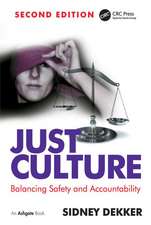Obstacles to Ethical Decision-Making: Mental Models, Milgram and the Problem of Obedience
Autor Patricia H. Werhane, Laura Pincus Hartman, Crina Archer, Elaine E. Englehardt, Michael S. Pritcharden Limba Engleză Hardback – 13 feb 2013
| Toate formatele și edițiile | Preț | Express |
|---|---|---|
| Paperback (1) | 321.27 lei 6-8 săpt. | |
| Cambridge University Press – 25 iun 2014 | 321.27 lei 6-8 săpt. | |
| Hardback (1) | 723.92 lei 6-8 săpt. | |
| Cambridge University Press – 13 feb 2013 | 723.92 lei 6-8 săpt. |
Preț: 723.92 lei
Preț vechi: 841.77 lei
-14% Nou
Puncte Express: 1086
Preț estimativ în valută:
138.52€ • 144.34$ • 114.70£
138.52€ • 144.34$ • 114.70£
Carte tipărită la comandă
Livrare economică 03-17 aprilie
Preluare comenzi: 021 569.72.76
Specificații
ISBN-13: 9781107000032
ISBN-10: 1107000033
Pagini: 260
Dimensiuni: 155 x 231 x 20 mm
Greutate: 0.5 kg
Ediția:New.
Editura: Cambridge University Press
Colecția Cambridge University Press
Locul publicării:New York, United States
ISBN-10: 1107000033
Pagini: 260
Dimensiuni: 155 x 231 x 20 mm
Greutate: 0.5 kg
Ediția:New.
Editura: Cambridge University Press
Colecția Cambridge University Press
Locul publicării:New York, United States
Cuprins
1. Introduction; 2. The role of mental models in social construction; 3. The Milgram studies: obedience, disobedience, and ethical challenges; 4. Obstacles to ethical decision-making in the perception of ethical context; 5. Obstacles to ethical decision-making in impact analysis and action; 6. Managing ethical obstacles; 7. Problematic mental models: some applications; 8. Conclusion; Author index; Subject index.
Recenzii
'The authors do a wonderful job of connecting the problem of obedience to the merging field of behavioral ethics. Their articulation highlights how common aspects about how humans make decisions lead us to be obedient when a more reflective analysis dictates action. Managers and scholars will be prompted to more courageous acts of disobedience after reading this book.' Max H. Bazerman, Straus Professor, Harvard Business School
'Whether you are a moral philosopher looking for a survey of relevant psychological science, a psychologist seeking deeper moral philosophical foundations, or a practitioner interested in what causes good people to make bad moral decisions, you have something to learn in these pages. Behavioral ethics is among the most important trend in business ethics today and this book is the single best resource available for in-depth coverage of the psychology, philosophy and practicality of this emerging field.' Robert Phillips, University of Richmond
'Combining research with practical examples, [Obstacles to Ethical Decision-Making] does an excellent job of bringing to light the important role that unreflective obedience plays in unethical decision making. At least as important, by identifying mechanisms to increase the rigor of our ethical reflection, it provides a path toward a more ethical future.' Ann Tenbrunsel, University of Notre Dame
'This book illustrates with case after case a vital message that should (and eventually will) become a central theme in business ethics and in leadership development programs globally. The message is that decision makers are too often imprisoned by their mindsets or 'mental models' - and that moral imagination represents their release. Contrary to popular opinion, conscience is far less about compliance and far more about emancipation. Both scholars and practitioners will find in these pages great insight into the moral failures - as well as the moral opportunities - of modern business life.' Kenneth E. Goodpaster, Koch Endowed Chair in Business Ethics, University of St Thomas, Minnesota
'This book takes a bold leap from the traditional normative critiques of business ethics to address the perplexing interaction of ethics and mental framing. The authors are multi-talented and draw on the latest research in moral decision-making to meticulously reconstruct the origins of our moral knowledge base. The book's insights into classic business ethics examples invite ethicists and practitioners to escape the confines of their own epistemological boundaries to effect the breakthrough that the authors call 'moral imagination'.' Laura Nash, co-author of Just Enough: Tools for Creating Success in Work and Life
'Whether you are a moral philosopher looking for a survey of relevant psychological science, a psychologist seeking deeper moral philosophical foundations, or a practitioner interested in what causes good people to make bad moral decisions, you have something to learn in these pages. Behavioral ethics is among the most important trend in business ethics today and this book is the single best resource available for in-depth coverage of the psychology, philosophy and practicality of this emerging field.' Robert Phillips, University of Richmond
'Combining research with practical examples, [Obstacles to Ethical Decision-Making] does an excellent job of bringing to light the important role that unreflective obedience plays in unethical decision making. At least as important, by identifying mechanisms to increase the rigor of our ethical reflection, it provides a path toward a more ethical future.' Ann Tenbrunsel, University of Notre Dame
'This book illustrates with case after case a vital message that should (and eventually will) become a central theme in business ethics and in leadership development programs globally. The message is that decision makers are too often imprisoned by their mindsets or 'mental models' - and that moral imagination represents their release. Contrary to popular opinion, conscience is far less about compliance and far more about emancipation. Both scholars and practitioners will find in these pages great insight into the moral failures - as well as the moral opportunities - of modern business life.' Kenneth E. Goodpaster, Koch Endowed Chair in Business Ethics, University of St Thomas, Minnesota
'This book takes a bold leap from the traditional normative critiques of business ethics to address the perplexing interaction of ethics and mental framing. The authors are multi-talented and draw on the latest research in moral decision-making to meticulously reconstruct the origins of our moral knowledge base. The book's insights into classic business ethics examples invite ethicists and practitioners to escape the confines of their own epistemological boundaries to effect the breakthrough that the authors call 'moral imagination'.' Laura Nash, co-author of Just Enough: Tools for Creating Success in Work and Life
Notă biografică
Descriere
An examination of how obedience affects and overpowers the ethics of decision-making in business, and how this can be overcome.











